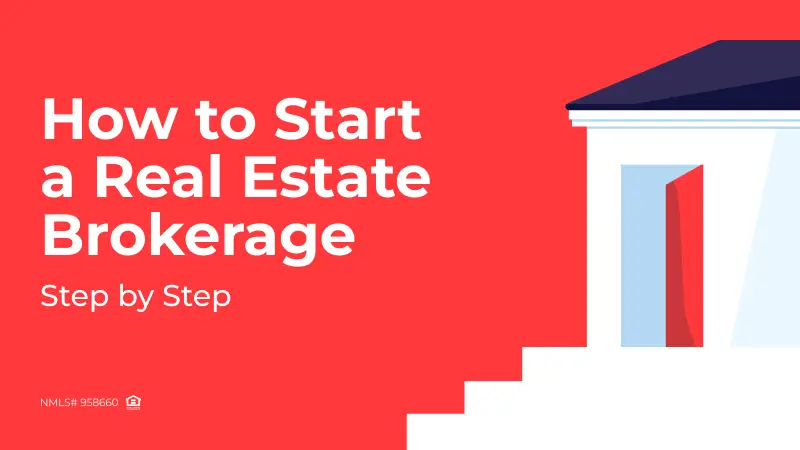
As a mortgage professional, the question “Do brokers own their own business?” has probably crossed your mind. Perhaps you’re tired of the corporate grind, dreaming of more control over your work and the freedom to build something truly your own. You’ve seen other mortgage brokers successfully transition into real estate, and the idea of expanding your services and building a powerful network is incredibly appealing.
But starting a real estate brokerage isn’t a walk in the park. There are countless challenges to overcome, from navigating complex regulations and securing funding to building a strong team and overcoming competition in the market. You need to understand the ins and outs of real estate law, marketing, and client management. You’ll be responsible for everything from finding and onboarding agents to managing transactions and ensuring compliance.
This article will guide you through the essential steps on how to open a real estate brokerage. We’ll explore the key factors that drive mortgage brokers to take the leap and break down the unique benefits and challenges that come with owning your own business. Whether you’re just starting to consider this path or are ready to dive in headfirst, this guide will provide you with the valuable insights and practical advice you need to succeed.
Steps to Open a Real Estate Brokerage
Before you dive into business cards and office space, it’s essential to honestly assess whether starting a real estate brokerage is the right move for you. This is a significant decision, and going into it with clarity and purpose is crucial. Ask yourself: why do brokers own their own business? Is it about achieving greater financial rewards, building something of your own, or creating a long-term legacy? While the potential for higher earnings is appealing, running a brokerage involves much more responsibility and commitment.
Take the time to evaluate your goals. Once you’re confident that this is the right decision for you, you’ll be ready to dive into our step-by-step guide on how to open a real estate brokerage.
Step 1: Assess Readiness and Motivation
First things first, let’s talk money. Owning your own business, especially a real estate brokerage, comes with significant financial responsibilities. You’ll need to cover startup costs like licensing fees, office rent or leasehold improvements, marketing expenses, and potentially hiring staff. You’ll also need to have enough working capital to cover operating expenses for the first few months.
Evaluate your current financial situation. Do you have enough savings to cover these costs without jeopardizing your personal finances? Have you considered seeking funding options like loans or investors?
Next, consider your personal motivations. Why do you want to own your own business? Is it for the freedom and flexibility? The potential for higher earnings? The desire to build something from the ground up? Being clear about your “why” will help guide your decisions as you move forward.
Enhanced Broker Portal
that makes your job easier
- All operations at your fingertips
- Easy-to-use intuitive interface
- Integrated AI technology
Next, you need to decide between two primary paths: starting an independent brokerage or joining a franchise.
An independent brokerage offers maximum freedom and control. You’ll have complete autonomy over your brand, marketing strategies, and business operations. However, you’ll also be solely responsible for building your client base, navigating regulations, and competing in a crowded market.
A franchise, on the other hand, provides a proven business model, established brand recognition, and ongoing support. You’ll benefit from the franchise’s marketing and training resources and have access to a network of other franchisees. However, you’ll have limited control over certain aspects of your business and may face franchise fees and royalties.
Carefully weigh the pros and cons of each option and choose the path that best aligns with your goals, risk tolerance, and financial resources. This initial assessment will lay the foundation for a successful and sustainable real estate brokerage.
Step 2: Obtain Licensing and Qualifications
Before you can even hang your shingle, you’ll need to navigate the licensing requirements in your state. These requirements can vary significantly, so it’s crucial to do your research.
Understanding State Requirements
In most states, you’ll need to meet specific education and experience requirements to obtain a broker’s license. This may involve completing real estate courses, passing a state licensing exam, paying fees, and sometimes even gaining a certain amount of real estate experience.
For example, in Florida, you typically need to complete 72 hours of pre-licensing education, pass the state licensing exam, be registered as an active sales associate for at least 24 months during the preceding five years, and pay a fee of $91.75.
In California, the process includes completing 360 hours of coursework, having at least two years of full-time licensed salesperson experience within the last five years or the equivalent, and paying a $395 fee.
These examples show that starting a real estate brokerage isn’t just about the financial commitment – it also requires a significant amount of time and effort.
Gaining Real-World Experience
While your background as a mortgage professional provides valuable knowledge about the financial aspects of real estate transactions, it’s generally advisable to gain some direct experience in real estate sales or property management before launching your own brokerage. This firsthand experience will give you a deeper understanding of the industry, build your network, and provide you with valuable insights into the day-to-day realities of running a real estate business.
Working as a Real Estate Agent First
Consider working as a real estate agent under a mortgage broker first. This will allow you to learn the ropes, build relationships with clients and industry professionals, and gain hands-on experience in areas like property listings, contract negotiations, and transaction management.
Investing time in acquiring the necessary licenses and gaining real-world experience will not only increase your chances of success but will also demonstrate your commitment and professionalism to potential clients and agents.
Step 3: Create a Business Plan
Once you have the licensing and qualification requirements figured out, it’s time to shift your focus to crafting a well-defined business plan. Think of this plan as your roadmap, guiding your decisions and keeping you on course as you build your brokerage.
Determining the Legal Structure
The first step is to determine the legal structure of your business. Common options include sole proprietorship, LLC, and corporation. Each structure has its own advantages and disadvantages in terms of liability, taxation, and administrative requirements. For example, sole proprietorships are the easiest to set up, but you’re personally responsible for all business debts. LLCs offer some protection from personal liability and more tax flexibility, but they’re a bit more complex to set up. Corporations offer the strongest protection from personal liability, but they’re the most complex and expensive to maintain.
Ask yourself, which structure best aligns with your goals, risk tolerance, and resources?
Crafting a Realistic Budget
As a mortgage professional, you’re probably familiar with the importance of thorough financial planning. Starting a brokerage is no different. Create a detailed budget that outlines all of your startup costs, including licensing fees, office rent or leasehold improvements, operating expenses, technology costs, and professional fees. Don’t forget to include ongoing expenses such as rent, utilities, salaries (if applicable), insurance, and marketing.
Learning From Successful Brokerage Models
To get a better understanding of what successful brokerage models look like, research and analyze other successful real estate companies. Look at how they’ve built their brands, their marketing strategies, and how they’ve cultivated a strong agent culture.
Consider visiting open houses, attending industry events, and networking with other real estate professionals to gain valuable insights and learn from their experiences. You can also research industry publications and online resources to stay informed about the latest trends and best practices in real estate.
By carefully considering your legal structure, creating a realistic budget, and researching successful brokerage models, you can develop a strong foundation for your own real estate business.
Step 4: Secure Financing
After creating a business plan, the next crucial step is securing funding for your new brokerage. While you may be tempted to bootstrap, obtaining outside funding can significantly accelerate your growth.
One option to consider is applying for an SBA loan. According to NerdWallet, “An SBA loan is a small-business loan that can help cover startup costs, working capital needs, expansions, real estate purchases, and more. This type of financing is issued by a private mortgage lender but backed by the federal government, specifically the Small Business Administration.” The Small Business Administration (SBA) offers a variety of loan programs that can be helpful. These loans can provide access to capital that may be difficult to secure through traditional bank loans. However, it’s important to remember that securing any loan comes with its own set of responsibilities and risks.
In addition to SBA loans, there are other financing options to explore. Traditional bank loans are another route, but they often come with stricter requirements. If you have a strong credit score and a solid business plan, this could be an option. Alternatively, you may want to consider private lenders or investor funding, which can provide the capital you need to start your brokerage.
Even with external funding, it’s vital to have a financial cushion. Unexpected expenses can occur in any business, and having reserves will help you weather any storms that may come your way. Without this cushion, you risk facing financial difficulties before your business has a chance to stabilize.
Whether you rely on personal savings, secure loans, or explore other financing options, careful financial planning is essential to the long-term success of your real estate business.
Step 5: Build a Brand
Building a brand is next on the list of steps to open a real estate brokerage. This is critical to attracting clients and establishing yourself in the competitive real estate market.
Start by choosing a name that reflects your values and target audience. Keep it concise, easy to remember, and ideally, available as a domain name for your website. A strong logo should visually represent your brand and be easily recognizable.
Don’t underestimate the power of a catchy tagline. A well-crafted tagline can effectively communicate your unique selling proposition and leave a lasting impression on potential clients.
A strong online presence is also essential. This includes a professional website that showcases your services, testimonials, and agent profiles. Consider using an easy-to-use customer relationship management (CRM) system to manage leads, track client interactions, and streamline your workflow.
Social media platforms like Facebook, Instagram, and LinkedIn offer valuable opportunities to connect with potential clients and attract new ones, share market insights, and build your brand awareness.
Remember, your brand should be authentic and reflect your values. Consistency across platforms and marketing materials is key. Building a strong brand takes time and effort, but it’s an investment that will pay off in the long run by attracting high-quality clients and building a loyal customer base.
Step 6: Establish Operations
Now that you’ve laid the groundwork, it’s time to establish your day-to-day operations. So, how do brokers own their own business? There are two main options: a traditional brick-and-mortar office or a virtual office. Each has its advantages and challenges.
Traditional Brick-and-Mortar Office
A physical office can provide a central hub for your team and create a professional image. However, it comes with the overhead costs of rent, utilities, and maintenance.
Virtual Office
A virtual office, on the other hand, offers flexibility and can significantly reduce overhead. You can work from home or co-working spaces, and modern technology allows you to connect with clients and agents remotely.
When deciding between the two, it’s important to weigh the pros and cons based on your business needs.
NAR Insights
As NAR (National Association of REALTORS®) notes, “Austin [John Austin, a Principal Broker and founder of America’s Best Real Estate] encourages brokers to seriously consider starting as a cloud-based, virtual brokerage. A home-based business lowers costs and offers advantages such as the ability to work at your own pace, the elimination of commuting to and from an office, and fewer office fees. You can always transition to a brick-and-mortar location later after the company’s income justifies the expense.” However, NAR also points out that “a virtual office might not be for you if you want to grow your company by adding several agents, or if you operate in a market where you want to attract foot traffic, such as a resort community.”
Investing in the Right Technology
No matter which option you choose, investing in the right technology is crucial to streamline your operations. This includes:
- CRM software to manage leads, track interactions, and communicate more effectively
- Document management systems to securely store and share important files like contracts
- Marketing automation tools to handle email campaigns, social media, and other outreach efforts
- Virtual meeting platforms to connect with clients and agents remotely
By carefully considering your office setup and investing in the right tools, you can create an efficient, productive environment that minimizes distractions and helps your business grow.
Step 7: Recruit Agents
One of the most important steps in opening a real estate brokerage is recruiting the right agents. Your agents are the driving force behind your business. They’re the ones who will bring in listings, close deals, and build client relationships.
Start by identifying and recruiting top talent. Collaborate with other real estate professionals, attend industry events, and leverage your existing network to find experienced and motivated agents.
Create a compelling value proposition that highlights the benefits of joining your brokerage. This could include competitive commission splits, comprehensive training programs, access to cutting-edge technology, and a supportive and collaborative work environment.
Choose a top nationwide lender that cares about your growth!
Get StartedOffer ongoing training and mentorship to help your agents succeed. This could include workshops on sales techniques, marketing strategies, and industry best practices.
Remember that retaining top talent is just as important as recruiting them. Foster a positive and rewarding work environment that encourages growth and recognizes individual achievements.
By investing in your agents’ success, you’ll not only build a strong and productive team but also enhance the reputation of your brokerage and attract more high-quality clients.
Challenges to Overcome When Starting a Real Estate Brokerage
Starting a real estate brokerage comes with its share of challenges. Competition is fierce, and you’ll be facing established brokerages with strong reputations and loyal client bases. Differentiating yourself and attracting top talent will be crucial for success.
Economic downturns can significantly impact the real estate market. Interest rate fluctuations, changes in consumer confidence, and shifts in the job market can all affect buyer and seller activity.
Navigating the complex legal landscape is another hurdle. Real estate law is constantly changing, and staying compliant with all regulations can be a significant challenge. You’ll need to be well-versed in fair housing laws, contract law, and other relevant regulations to ensure that your brokerage operates ethically and legally.
Conclusion
So, do brokers own their own business? Yes, many do, and with the right approach, you can too. Starting your own real estate brokerage is challenging but rewarding. It requires careful planning, dedication, and a deep understanding of the industry. By thoroughly assessing your readiness, obtaining the necessary licenses, and building a strong foundation, you can increase your chances of success.
Remember, building a successful brokerage takes time and effort. While there will be obstacles along the way, with perseverance, a strong work ethic, and a focus on providing exceptional service to your clients, you can achieve your goals.
If you’re considering taking the plunge and starting your own real estate business, we encourage you to do your research, create a solid business plan, and explore all your options.
At A&D Mortgage, we understand the challenges and rewards of entrepreneurship. We’re committed to supporting our clients and fostering strong relationships within the industry. If you’re interested in exploring potential partnership opportunities, we invite you to contact us.


